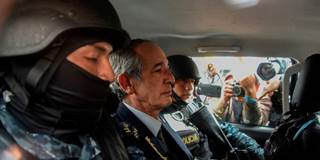From Brazil to Mexico, those tasked with upholding the rule of law are increasingly wielding the administration of justice for partisan purposes. At a time of intensifying political polarization, this does not bode well for Latin America’s future.
PARIS – In April, former Brazilian President Luiz Inácio Lula da Silva surrendered to police to begin serving a 12-year prison sentence for passive corruption and money laundering. It was just the latest in a string of arrests and prosecutions of Latin American political and economic leaders – a trend that began four years ago, with the eruption of the Brazilian Odebrecht Group’s bribery scandal. But while a crackdown on corruption is badly needed, the increasingly politicized approach is placing the entire region on a slippery slope.

PARIS – In April, former Brazilian President Luiz Inácio Lula da Silva surrendered to police to begin serving a 12-year prison sentence for passive corruption and money laundering. It was just the latest in a string of arrests and prosecutions of Latin American political and economic leaders – a trend that began four years ago, with the eruption of the Brazilian Odebrecht Group’s bribery scandal. But while a crackdown on corruption is badly needed, the increasingly politicized approach is placing the entire region on a slippery slope.